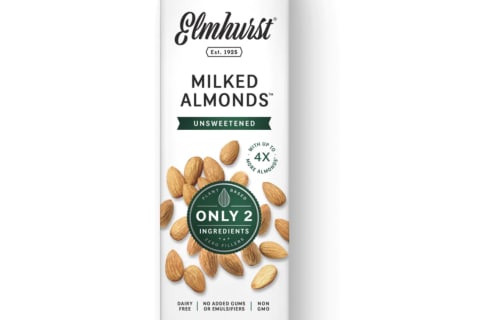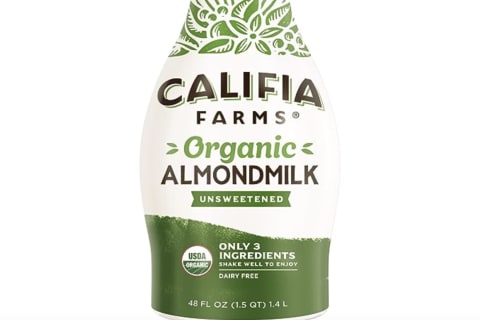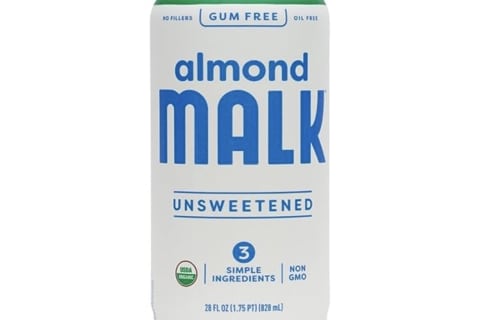Is Almond Milk Good For You? How It Compares To Whole Milk, Oat Milk & More

These days, milk can mean a lot of things. There are no shortage of alternatives to cow's milk—hemp, oat, soy, and cashew, to name a few—but almond milk remains the most popular nondairy milk. However, questions continue to swirl around the beverage, like: Is almond milk healthy? Can it replace cow's milk? And what about those environmental issues we keep hearing about?
If you've got concerns about including almond milk in your diet, here's what nutritionists have to say about whether or not it's good for you.
Almond milk nutritional value
Almonds can't literally be milked—at least, not like a cow. But they can be processed with a method that uses water to pull nutrients and flavor from the nuts. This yields the thin white liquid that makes an easy addition to smoothies, baked goods, and your morning coffee.
Just note that "milking" almonds removes some of their inherent nutritional value.
"Versus whole almonds, almond milk has much less fiber, protein, and even less of some antioxidants. After ground almonds are soaked in water, the flesh or pulp of the nut is removed, and that happens to be where the fiber and protein remain," says Kelly Jones, M.S., R.D., CSSD, a performance dietitian.
"Almond milk also tends to be made from skinless almonds. Since the skins contain antioxidants, those are lost in processing," Jones adds.
Depending on the almond milk you choose, you may also get less calcium in a cup of almond milk than in a serving of whole almonds. (Straining out almond pulp tends to remove calcium.)
That said, most commercially available almond milks are fortified with calcium—often resulting in higher levels than a glass of cow's milk. Many almond milks also contain added vitamin D to match or exceed the amount in cow's milk.
Summary
Compared to other milks
Again, almond milk reigns supreme as the nation's most popular alt-milk—but that doesn't mean it's the only option. To figure out whether almond milk1 meets your health needs, it's a good idea to consider how it compares to other choices like cow's milk2, soy milk3, and oat milk4.
Almond milk nutrition vs. other milks
| Milk (1 cup) | Almond milk | Whole milk | Soy milk | Oat milk |
|---|---|---|---|---|
| Calories | 39 | 149 | 129 | 120 |
| Carbs | 3 grams | 12 grams | 13 grams | 16 grams |
| Fat | 2.5 grams | 8 gram | 5 grams | 5 grams |
| Protein | 1 grams | 8 grams | 8 grams | 3 grams |
| Calcium | 482 milligrams | 276 milligrams | 237 milligrams | 350 milligrams |
The thing you may notice first: almond milk is significantly lower in protein than cow's milk and soy milk. It also has 2 grams less per serving than oat milk. If protein is a major priority in your diet (as it should be!), you may want to use almond milk sparingly.
Cow's milk also offers more of some important micronutrients like potassium and phosphorus. In fact, a 2021 study5 found that cow's milk was the best overall source of micronutrients, compared to alternative milks. On the other hand, if you're looking to reduce carbs or calories or add calcium, vitamin D, or vitamin E to your diet, almond milk is a better choice.
Summary
Almond milk benefits
Almond milk may have some benefits for health, mostly due to the fact that it's lower in calories and carbs than other options.
It may be good for high blood pressure.
Though research on a connection between almond milk and blood pressure is limited, the milk's plant food status is a point in its favor. "Those with high blood pressure can benefit from including more plant foods in any amounts, as well as increasing their intake of potassium, calcium, and magnesium while keeping sodium under 2,300 mg," says Jones.
It can be good for diabetics.
"Almond milk can be a great choice for people with diabetes, as it's low in calories and carbohydrates," says dietitian Jen Scheinman, M.S., R.D. "Even the sweetened versions tend to have 8 grams of sugar or less per serving." If you're not diabetic, almond milk's 3 grams of carbs per cup can also fit into a low-carb or keto diet.
It may promote weight loss.
With its low calorie and carb counts, almond milk can be a good beverage for those looking to lose weight. A 2016 study found that when 30 subjects substituted one daily serving of dairy with 1 cup of almond milk, they had decreased body weight, body mass index, and waist and hip circumference after four weeks significantly.
However, since it's lower in protein than other options, almond milk may not be as satiating.
It's ideal for people with certain food allergies.
If lactose intolerance or a soy allergy keeps you from drinking dairy or soy milk, almond milk provides an easy alternative. People with tree nut allergies or intolerances will need to steer clear of almond milk, though.
Summary
Almond milk drawbacks
These are some drawbacks of the nutty drink, including its low protein count and questionable impact on GI health:
It's lower in protein than other options.
The nutrition facts table above shows a major gap in almond milk's nutrition profile: its protein content. A mere 1 gram is all you'll get from a cup of almond milk. Protein is an essential macronutrient for building bones, muscles, cartilage, and more, and most people don't get enough of it in their diet. You should aim to get at least 25 grams of protein at each meal—a goal that almond milk will not help you with.
Almonds are a water-intensive crop.
Almonds and their milk have long been dogged by concerns around unsustainable water usage. According to one report, it takes 1,611 gallons of water to produce just 1 liter of almond milk. (However, other reports place the number much lower.) Almonds are extremely thirsty plants, and turning them into "milk" requires even more water.
Of course, there are environmental concerns with other milks, too. If you're looking for the most sustainable option, you'll probably want to reach for hemp milk or flax milk, which are made from relatively low-impact crops.
Almond milk may cause bloating.
Find yourself feeling bloated after a glass of almond milk? It could be due to added fillers and gums. "Some people experience bloating and GI upset from these gums," says Scheinman. "There's also some concern that these additives can alter the gut microbiome."
If additives seem to give you the dreaded bloat, Scheinman recommends a "truly clean" almond milk with no additives or gums.
It's lower in some micronutrients than cow's milk.
Almond milk isn't a one-to-one swap for cow's milk. Besides its lower protein content, the nutty drink contains significantly less phosphorus and potassium—two important nutrients for general health.
Summary
Shopping tips
Snagging the best store-bought almond milk comes down to being a diligent label reader.
Since many kinds of almond milk contain additives that can cause gas and bloating, you'll want to look for a bottle that contains a brief ingredient list of almonds, water, and potentially some added vitamins.
As you shop, check, too, for added oils and sugars, which rack up calories without adding beneficial nutrients. Some almond milks with these extras can actually be classified as ultra-processed foods6—a category of foods associated with health issues like weight gain7 and heart disease8.
Of course, if you'd like to use almond milk in sweet preparations like baked goods, there may be a time and place for purchasing a sweetened version. But for the most health benefits from everyday use, an unsweetened variety does the trick.
mbg's picks for unsweetened almond milks
How to make your own almond milk
Making your own almond milk is a great way to opt out of questionable additives and enjoy the freshest beverage possible. All it takes is almonds and water! Try out this simple base recipe, adding optional flavorings as you wish:
Core ingredients:
- 1 cup almonds
- 4 cups water
Optional flavorings:
- 3 pitted dates
- ¼ teaspoons cinnamon
- ½ teaspoons vanilla extract
Method:
- Soak almonds in water for 8 to 12 hours. Drain and rinse.
- Blend almonds and water for about 1 minute or until smooth. Add in dates if you're using them.
- Over a large bowl, strain the pulp using a cheesecloth.
- Optional: Add the cinnamon and vanilla extract and whisk until combined.
- Store in the fridge for up to 4 days.
Don't throw out that pulp!
FAQ
Is it good to have almond milk every day?
If you enjoy drinking almond milk every day, you're in the clear to keep it up. However, you should note that it's lower in protein, fat, and micronutrients than other types of milk like cow milk.
Is almond milk better for you than regular milk?
Almond milk and cow's milk each have their benefits and drawbacks, so determining which one is better for you comes down to your personal health needs. Nutritionally speaking, cow's milk has an edge since it's higher in protein and certain macronutrients. However, some may be sensitive to the dairy in cow's milk, or they might choose to avoid it for environmental or animal welfare reasons.
What should you avoid when buying almond milk?
Avoid almond milk that contains added sweeteners, emulsifiers, and gums. These milks tend to be very highly processed and can lead to health issues like weight gain and heart disease.
The takeaway
Almond milk can be a suitable option for those who have cow milk allergies or are looking to cut carbs, boost their calcium, or eat more plant-based foods. However, it's not a perfect switch for alternatives like dairy milk in terms of protein and all micronutrients. For a deeper dive into other kinds of milk, head to this nutritionist power ranking.

Sarah Garone, NDTR is a licensed nutritionist and freelance health and wellness writer in Mesa, AZ whose work has appeared in numerous publications. After a first career as a college German teacher, health problems led her to pivot her work to the way food impacts wellness. In addition to her writing, Sarah enjoys spending time with her husband and three teenage kids, cooking, running, volunteering at a certified pro-women's healthcare center, and singing in a concert choir.
8 Sources
- https://fdc.nal.usda.gov/fdc-app.html#/food-details/174832/nutrients
- https://fdc.nal.usda.gov/fdc-app.html#/food-details/171265/nutrients
- https://fdc.nal.usda.gov/fdc-app.html#/food-details/2340784/nutrients
- https://fdc.nal.usda.gov/fdc-app.html#/food-details/719016/nutrients
- https://pubmed.ncbi.nlm.nih.gov/33373745/
- https://pubmed.ncbi.nlm.nih.gov/34291276/
- https://www.cell.com/cell-metabolism/fulltext/S1550-4131(19)30248-7
- https://www.acc.org/about-acc/press-releases/2021/03/22/18/46/ultra-processed-foods-are-breaking-your-heart


